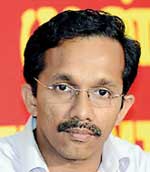Thursday Feb 19, 2026
Thursday Feb 19, 2026
Saturday, 12 November 2016 02:05 - - {{hitsCtrl.values.hits}}
Parliament yesterday kicked off the month long Budget debate, with the Opposition criticising moves to trim capital expenditure, while the Government reiterated their confidence in the pro-growth financial plan for next year.
The Government came under fire from the opposition for reductions in capital expenditure in a host of critical areas including Education and Healthcare, while imposing a yet another fresh round of taxes.
The Janatha Vimukthi Peramuna (JVP) came down hard on the Government’s fiscal plan for next year, stating that the Government has imposed a fresh set of taxes on the already burdened citizens of the country. Claiming Budget 2017 lacked vision, JVP MP Sunil Handunnetti questioned the Government on allocations made last year on 147 new proposals.
“Last year, there were 147 new proposals with an allocation of Rs.253 billion. This year Rs.130 billion is allocated, mostly for the same projects. What happened to those allocations made in 2016?” he demanded.
Criticising the Finance Minister’s tactic of reading out a few budget reliefs in Sinhala while reading the taxes in English, Handunnetti said Budget 2017 is nothing more than the true picture of the economic crisis the Government is currently faced with.
“Your plan is to have tax on tax. Budget 2017 came just after 10 days from moving the VAT Bill in Parliament. You could have made the VAT a part of this budget, which imposed taxes on all Sri Lankans: Road rule penalty tax, carbon tax, litigation tax, internet tax, easy cash tax, tele tax, SIM card tax, nation building tax, corporate tax, to name a few,” he said.

|
Calling out the Government on its failure to follow its own policy document, Main Opposition Tamil National Alliance (TNA) MP M. A. Sumanthiran pointed out that some of the positive proposals from 2016 had yet to be implemented. He questioned the reasons for scrapping last year’s Budget proposals to decentralise the revenue collection process while warning that moves to trim capital expenditure will result in increasing inequality and social exclusions.
“After several years, the expenditure for 2017 is lower compared to 2016. This is after a long time. The recurrent expenditures are difficult to do away. So, it is on capital expenditure the reductions are made. So, how do you achieve growth reducing capital expenditure? This will result in a negative growth,” charged MP Sumanthiran.
However, the Government stood strong on its conviction that Budget 2017 was a comprehensive and forward-looking policy document. Defending the proposal, Minister of Public Enterprise Development Kabir Hashim reiterated that the current economic crisis is not of their doing, and outlined a number of price reductions afforded by this budget in comparison to prices during the Rajapaksa regime.
“This is a pro-public budget. We consider this a victory. Last year we had issues with Budget 2016. But we were able to reduce the burden this year by lending an ear to the people,” he said.